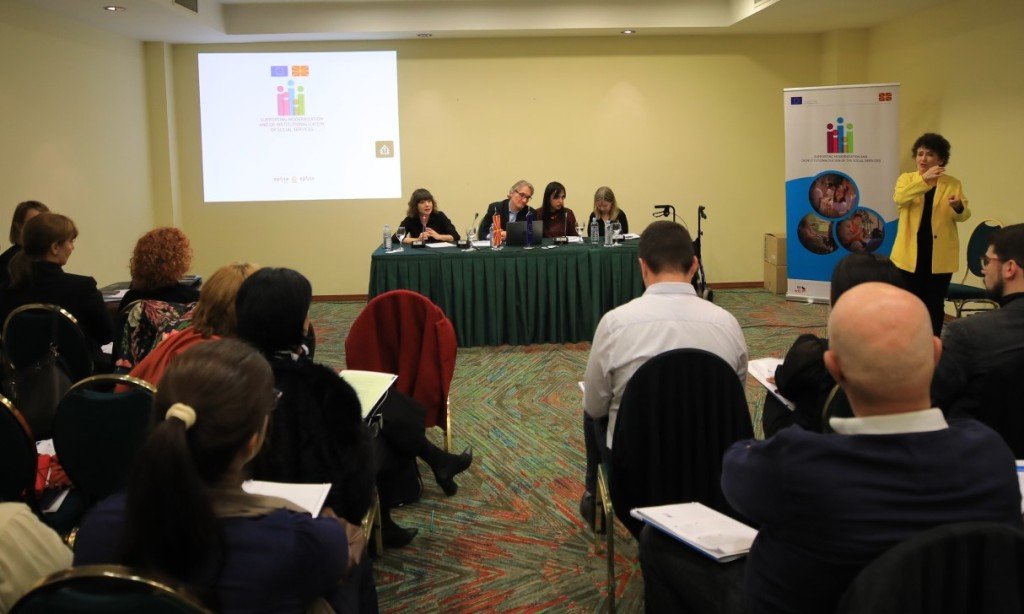Investing in social services – investing in people was the topic of the Conference organized by EPTISA, with technical support of the Republic Centre for Support of Persons with Intellectual Disability – PORAKA. The conference was held on 18th of December in Holiday Inn in Skopje and was attended by large number of stakeholders that are directly involved in the work of the social services in our country.
The new legal frameworks in Macedonia were presented at the Conference, more specifically, the bylaws on social services prepared by the Ministry of Labour and Social Policy, supported within the project “Supporting Modernization and De-institutionalization of social services” implemented by EPTISA. The following bylaws acts were reviewed: home assistance and care, personal assistance, foster care, supported living and services in the community.
The Minister of Labour and Social Policy, Mila Carovska attended the conference. “As a Government that cares for the promotion and protection of the human rights of all persons with disabilities, with the development of social services, we are changing the model of support our fellow citizens receive and changing the awareness of citizens in embracing diversity. Moreover, North Macedonia is the first country in the region that changes the way of funding the services through methodology for determining the prices and making decisions regarding the price level of services. Through this model we will contribute to the introduction of variety of services and will create new jobs in the social protection sector, and citizens will receive quality support on local level”, said Carovska.
Sophie Beaumont, representative of the EU Delegation emphasized that the Delegation is recognizing the high level of dedication of Minister Carovska in advancing the services based in the community, the process of decentralizations and building the capacities on local level.
“In order for social services to be successfully realized, it is necessary for all professionals in the social sector, as well as the beneficiaries, municipalities and civil society organizations to be actively involved in the process and must have full understanding about the legal framework. Also, it is important that all parties in this process receive information from the Government in regard to practicing the Law i.e. how the law is being implemented, what are the advantages and disadvantages in the implementation. The Delegation of the European Union together with other partners – especially UNICEF and World Bank are working together to strengthen the available resources for implementing the requirements of the Law. Large part of the commitments has been undertaken by the Ministry of Labour and Social Policy, who have worked together with experts in drafting these laws” said Sophie Beaumont, representative of the EU Delegation.
Robert Kroiss, Team Leader of the project “Supporting Modernization and Deinstitutionalization of Social Services”, which EPTISA is implementing in the past period, financed by the European Union, highlighted that EU is supporting the Government’s efforts in implementing the National Strategy for deinstitutionalization.
“The purpose of this project is to support the establishment and availability of social services in the community throughout the country and to reduce the number of children and adults with disabilities living in long-term residential institutions, and in particular to support the development of appropriate legal and political framework in the implementation of the Strategy, to strengthen the capacity of state and non-state actors at national and local level to implement the Strategy, especially among officials of local government institutions”, said Robert Robert Kroiss.
The Secretary General of the Republic Centre – PORAKA, Vasilka Dimoska MD, and the Programme Manager, Vlado Krstovski, gave their contribution in realizations of this important conference, as moderators on two sessions about the new regulations for functioning of social services for personal assistance and assistance at home, as well as the services in the community i.e. Day Centres for different target groups.
The Regulations, according the Law on Social Protection, shall enter into force by the end of 2019.
©2023, PorakaAll rights reserved.
Made by Artifex Creative



